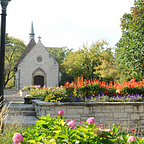Global Jesuits open up about possibility: Michael Zeps, S.J.
Mission Week Feature Series
What is your international ministry experience? How long did you spend there?
I went to Austria to do research for my doctoral dissertation. The research was on church, state and education in the 1930s. I really needed access to church archives and got it through the intercession of Kurt Schuschnigg who was the Chancellor of Austria in the 1930’s and taught me at Saint Louis University in the 1960’s. With a letter from him, I did a lot of research, finished the Ph. D. at Stanford in 1979 and came to Marquette immediately thereafter. As I was working, I noticed a lot of public housing projects in Vienna dating from the interwar years that had suspiciously military features. Once I got established at Marquette, I went back to Vienna to research the structures and their possible military applications, eventually taking pictures of all 375 buildings over the course of several years. I just finished that book last May after retiring from the history department.
Marquette Ministry Focus
I taught history of various sorts including military history, intellectual history, church history, music history and a number of other things. I moved into Cobeen Hall, a women’s residence hall, to balance academics with ministry, and have been there ever since, doing the usual priestly things like saying mass, otherwise living and taking meals with the members of the community in the Jesuit Residence. That’s been my ministry for the last 42 years.
Most impactful or memorable experience abroad?
It had to do with research. I started doing research in city hall on documents connected with the buildings and shortly after I started the person in charge of acquiring the documents and bringing them to city hall suggested I could go into the depot on my own without supervision to do the work there. That made all the difference in the world. She later became the head of the archives. So the most memorable experience had to do with consulting documents that took place over months as I went back and forth every day to the depot.
How did your time working internationally change your approach to your ministry and its possibilities? How have you implemented those changes at Marquette? International travel had to do with my studies and professional life from the start. The most dramatic change was from being a student to becoming a professor. As a priest, I had already been a student for several years. Ministry as a priest did not change as much because when I came to Marquette I had been living in a dorm in California. The biggest change was the transition from being a student to being a professor. But regarding Vienna, when you are in a great city for a long time, you become immersed in the whole culture, like music — Vienna has an opera and one of the greatest orchestras in the world — night life with its excellent food and distinctive wine shops, hikes in the mountains and much more that is part of life beyond professional involvement. All in all, Austria and Vienna became a remarkably rich part of my life. The students at Marquette were beneficiaries for sure.
How does your international experience inform you of the Jesuit mission?
I had been a Jesuit for 20–30 years already, so I wasn’t being newly formed, but rather was expanding the Jesuit experience. In Vienna, I lived in the provincial’s residence rather than an academic community and met a lot of men with different interests from administration to finances to ministry, even the provincial himself who was a fine philosopher. It broadened greatly the experience of Jesuit life.
